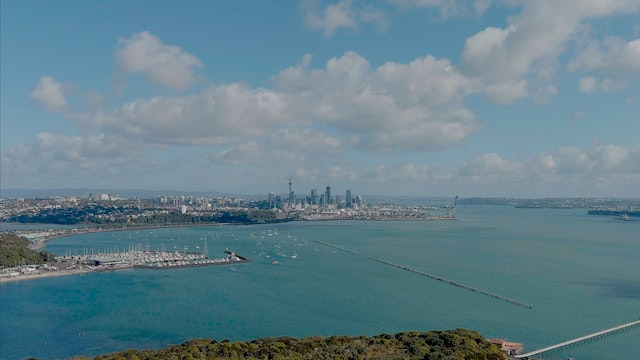Is the Auckland’s Housing Market still in the Crisis? Find Out …
-
By Hadar 11th Oct, 2023

Auckland’s housing market is in a precarious state, as property prices have shown signs of deterioration in 76 suburbs over the past three months, just as the traditionally busy spring season arrives. This decline is a disheartening development for homeowners, who had recently glimpsed signs of recovery. However, prospective buyers now face the double whammy of escalating prices and soaring interest rates. This analytical article delves into the factors responsible for Auckland’s housing market woes and explores the broader implications of this downturn for New Zealand’s real estate landscape.
A Lingering Slump
New Zealand’s median house price took a significant nosedive, losing over $150,000 in value during a 15-month slump following the market’s peak in November 2021. Data from the Real Estate Institute reveals that prices reached an all-time high of $925,000, only to plummet by 18% to $762,000 in February of this year. The median price now stands at $767,000. Auckland, mirroring the national trend, witnessed a dramatic price decrease, falling from $1.3 million in November 2021 to $943,000 in January 2022 before limping back to $1.01 million.
CoreLogic’s latest data presents a grim picture, showing that a robust recovery remains elusive, despite the earlier glimmers of hope. Prominent Auckland suburbs such as Birkdale, Stonefields, Howick, and Ōtara have experienced price increases of just 2% since June 1. Even luxury suburbs like Herne Bay, Parnell, and Ponsonby have witnessed feeble price hikes of at least 1.7% over the past quarter. The housing downturn is universal, affecting a broad spectrum of suburbs, encompassing both the higher and lower ends of the market.
A Nationwide Crisis
Regrettably, this housing market crisis is not confined to Auckland. CoreLogic’s data illustrates that in the past three months, prices have waned in 269 out of 924 suburbs across New Zealand. A comparison between June and September shows a distressing increase in the number of suburbs facing price declines. In June, 71 suburbs had recorded a modest rise of at least 0.5% in the previous three months. However, by September, that number has escalated to 188, underscoring the breadth of the crisis.
Factors Driving the Descent
The housing market’s gloomy state is shaped by several distressing factors. Interest rates, though unlikely to rise further, have already climbed to staggering heights. Migration into New Zealand has surged, increasing the demand for housing. As a result, population growth is now outstripping supply, which spells disaster for affordability. Any potential rate reductions by the Reserve Bank in the coming year could offer a glimmer of hope, but the path to recovery remains uncertain.
While current homeowners might be somewhat relieved to see a partial rebound in prices, affordability issues loom large. High housing costs continue to eat into take-home pay, exacerbating inequality and poverty.
The Final Word
Auckland’s housing market is caught in a precarious situation, facing a protracted downturn, exacerbated by rising prices and soaring interest rates. Government policies, economic conditions, and the complex web of stakeholders will play a crucial role in determining the market’s future trajectory. The current state of the market, on the precipice of a national election, adds an extra layer of uncertainty, with the implications of the downturn becoming increasingly evident in the months ahead. For now, the market remains characterized by instability in interest rates, muted listing inquiries, and dwindling seller confidence. The ongoing affordability crisis underscores the dire circumstances in Auckland and New Zealand’s housing markets.
Do You Want To Sell Us Your house?
Request No Obligation Offer!
- New Zealand Housing Market: A Calm December Amidst Economic Uncertainty
- New Zealand Housing Market Update: Downturn Slowing, First Time Buyers on the Rise
- Selling Your Christchurch Home Privately: A Quick Guide
- New Zealand’s Housing Market – Sep 2024 Updates: High Prices and Slow Recovery
- New Zealand Housing Market Slumps in June Amidst Rising Listings and Waning Demand
- Auckland Real Estate Market(26)
- Christchurch Real Estate(38)
- new zealand real estate(32)
- Property(3)
- Sell Your House As-Is(16)
- Uncategorized(1)
- February 2025 (1)
- November 2024 (1)
- October 2024 (1)
- September 2024 (1)
- July 2024 (1)
- June 2024 (2)
- April 2024 (1)
- March 2024 (1)
- February 2024 (1)
- January 2024 (1)
- December 2023 (1)
- November 2023 (1)
- October 2023 (1)
- September 2023 (1)
- August 2023 (1)
- July 2023 (1)
- April 2023 (1)
- March 2023 (2)
- February 2023 (2)
- January 2023 (1)
- December 2022 (1)
- November 2022 (1)
- October 2022 (1)
- July 2022 (1)
- June 2022 (1)
- April 2022 (1)
- March 2022 (1)
- February 2022 (1)
- January 2022 (1)
- December 2021 (1)
- November 2021 (1)
- October 2021 (1)
- September 2021 (2)
- August 2021 (1)
- July 2021 (2)
- June 2021 (2)
- May 2021 (1)
- April 2021 (1)
- February 2021 (1)
- December 2020 (3)
- November 2020 (1)
- October 2020 (3)
- August 2020 (2)


